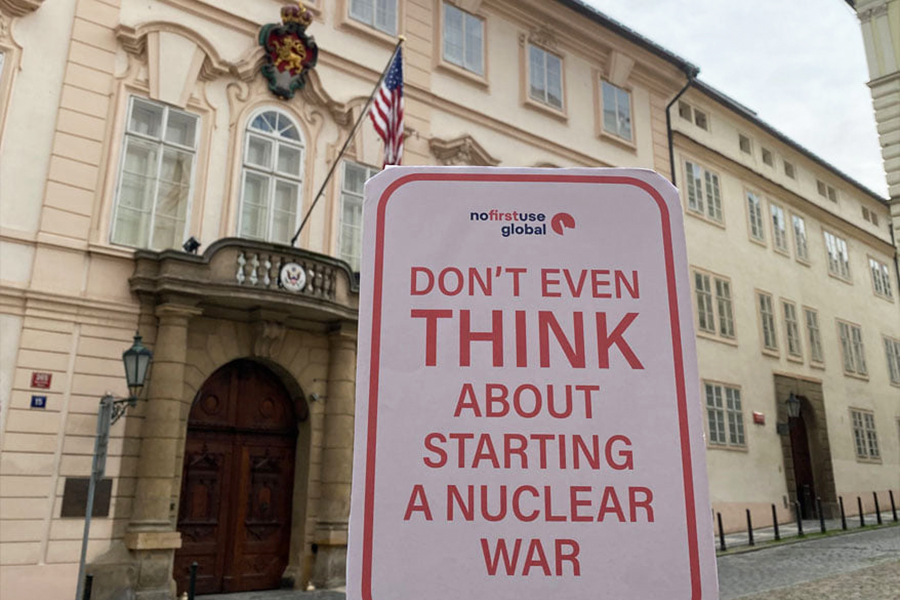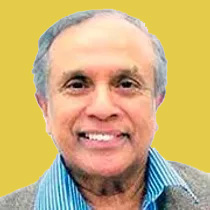In New York City, where streets in mid-town Manhattan are routinely congested and the traffic flow incredibly overwhelming, there is a warning sign outside some buildings that says it all: DON’T EVEN THINK OF PARKING HERE.
If you do, either your vehicle will be towed away or you will be subject to a heavy fine.
In a take-off of that sign, UNFOLD ZERO, in its relentless campaign for nuclear disarmament, has invited anti-nuclear activists world-wide to take images of themselves and/or a colleague holding a sign ‘Don’t even think about starting a nuclear war’ outside the embassies or consulates of nine nuclear-armed states – especially China, France, Russia, the UK and the US.
These five have a special responsibility to prevent nuclear war as they are the veto-wielding permanent members (P5) of the UN Security Council and they are the nuclear-armed states that are parties to the Non-Proliferation Treaty. The other four nuclear powers include India, Pakistan, Israel and North Korea.
And two of the nuclear powers—Russia and Israel—are now at war: Russia in a long-drawn-out war with Ukraine and Israel battling the Palestinian armed force, Hamas.
Russia has, on several occasions, threatened to use nuclear weapons, but Israel hasn’t—at least so far.
UNFOLD ZERO is a platform for United Nations-focused initiatives and actions for the achievement of a nuclear weapons-free world., which “aims to unfold the path to zero nuclear weapons through effective steps and measures facilitated by the UN General Assembly, Security Council, UN Secretary-General and other UN bodies.
Zero nuclear weapons
The aim of zero nuclear weapons—In the prohibition and complete elimination of nuclear weapons under strict and effective international control – was first affirmed by UN General Assembly resolution 1 (I) on 24 January 1946.
“A reliance on nuclear deterrence by some countries in response to regional and international tensions since then has thwarted the achievement of this goal. However, a number of recent developments bring this goal into sight”, warns UNFOLD ZERO.
These include globalisation, the strengthening of international law, a growing public aversion to all weapons of mass destruction and the increasing effectiveness of the United Nations and other cooperative security mechanisms to address core security issues.
UNFOLD ZERO has provided a sample letter to anti-nuclear activists to urge their respective governments to promote nuclear abolition at UN high-level meetings on the Elimination of Nuclear Weapons.
On Hiroshima Day, 6 August 2023, the UN Secretary-General warned that we are in a time of nuclear danger not seen since the height of the Cold War. “The drums of nuclear war are beating once again. Mistrust and division are on the rise. The nuclear shadow that loomed over the Cold War has re-emerged. And some countries are recklessly rattling the nuclear saber once again, threatening to use these tools of annihilation.”
UNFOLD ZERO says any use of nuclear weapons would have catastrophic human, economic and environmental consequences.
Sustainable development instead of nukes
“The use of just a small fraction of the 13,000 nuclear weapons in the world’s stockpiles could end civilization as we know it. In addition, the $100 billion spent annually on nuclear weapons is sorely needed for environmental, economic and human needs, including addressing the COVID-19 pandemic and implementing the Sustainable Development Goals.”
In the proposed letter to governments, it encourages, in particular to:
1 – Welcome the statement adopted by the G20 Leaders in Bali (November 2022) that “the threat or use of nuclear weapons is inadmissible”;
2 – Support policies of no-first-use to help prevent nuclear war and pave the way for nuclear disarmament;
3 – Highlight the role that common security can play to replace the reliance on nuclear deterrence;
4 – Call for a time-bound commitment to achieve the total elimination of nuclear weapons no later than 2045, and for this commitment to be affirmed at the UN Summit of the Future (September 2045) and the Non-proliferation Treaty Review Conference (2026);
5 – Support cuts in the global nuclear weapons budget (currently over $100 billion per year), an end to investments in the nuclear weapons industry, and a reallocating of these budgets and investments to support climate protection, peace and sustainable development.
Meanwhile, Jonathan Granoff, President of the Global Security Institute, warns, “This is a moment of extreme danger for the world.”
“Nuclear war remains an increased existential hazard for humanity. It is amplified by the Ukraine war and the bellicose outrageous threats of Russia, as well as the failure of the United States, NATO and Russia to renounce their present doctrine that admits the first use of nuclear weapons, a policy at odds with the platform that President Biden promoted in his election campaign that declared the sole purpose of having nuclear weapons is to prevent them from being used”.
Simultaneously, instead of progress toward fulfilment of the UN resolution establishing Israel that called for a two-state solution with a stable Israel and Palestine living side by side, “we are shocked by the inhumane attacks on innocent civilians by Hamas and the horrors of the responses by the Netanyahu administration. Chaos, fear, bloodshed, winds of escalation, drumbeats of hatred make unrelenting work for peace necessary.”
Travelling through the night of a storm requires a clear compass, says Granoff.
President Biden promoted in his election campaign that declared the sole purpose of having nuclear weapons is to prevent them from being used”.
“We hope that our work will be of service in leading to a peaceful, sustainable future,” declares Granoff.
Thalif Deen, is IPS United Nations bureau chief and regional director North America, and has been covering the UN since the late 1970s. A former deputy news editor of the Sri Lanka Daily News, he was also a senior editorial writer for the Hongkong daily, The Standard. He has been runner-up and cited twice for “excellence in UN reporting” at the annual awards presentation of the UN Correspondents Association (UNCA). Deen is a former military editor Middle East/Africa at Jane’s Information Group in the US, a columnist for the Sri Lanka Sunday Times and a longtime UN correspondent for Asiaweek, Hongkong, and Jane’s Defence Weekly, London. He is a Fulbright scholar with a master’s degree in journalism from Columbia University, New York.








